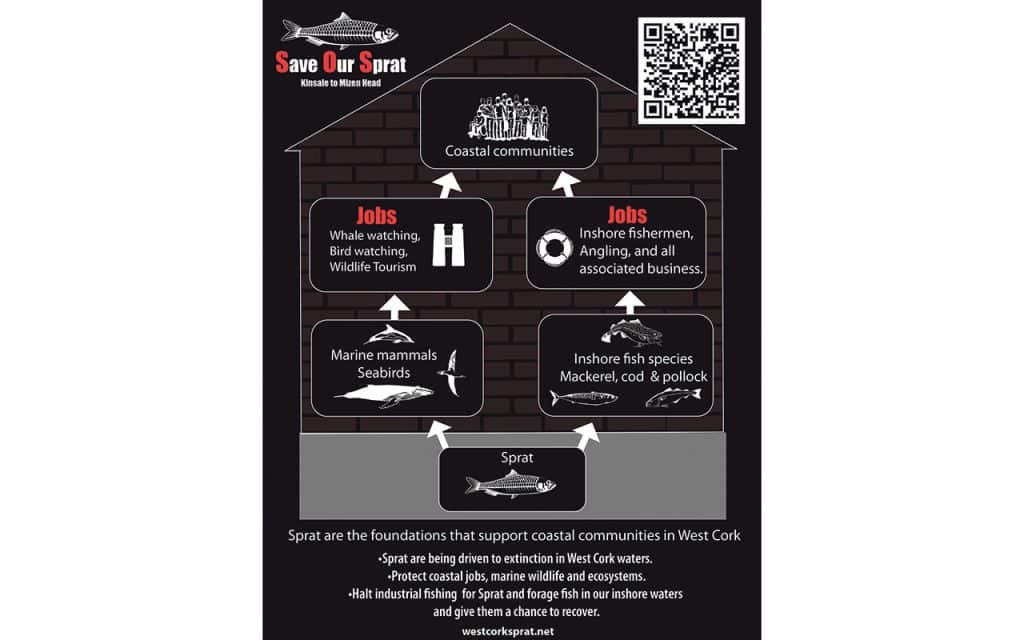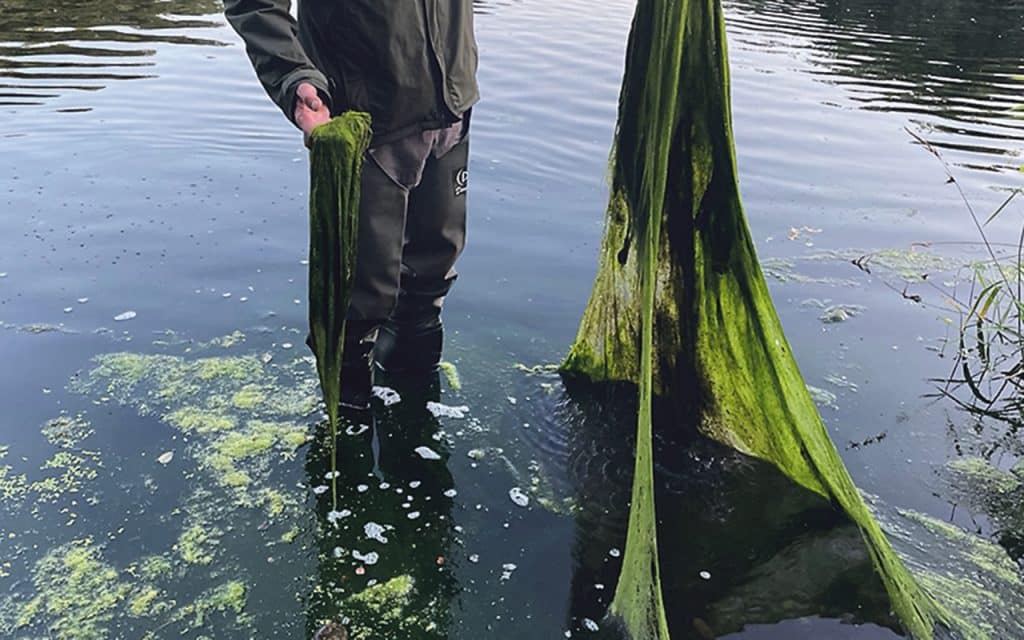Pádraig Whooley of the Irish Whale and Dolphin Group (IWDG) and the ‘Save our Sprat West Cork’ campaign explains why sprat, along with a handful of other forage fish, are critically important keystone species and the detrimental effect their decline will have on coastal communities in West Cork.

Sprat feed almost everything else in our inshore waters, including other more commercially important fish species, our seabirds, our marine mammals, all the way up to the iconic humpback and the mighty fin whale. Without sprat there can be no shore and boat-based angling, whale watching, marine eco tours, or pelagic bird watching, and even activities like diving and sea kayaking will feel the effect. We also can’t forget the vast majority of small inshore fishermen who find themselves trying to eke out a living in increasingly barren West Cork waters. Against this backdrop you begin to get an idea as to just how important the humble sprat is for coastal communities. We have only to look at places like Courtmacsherry, Union Hall and Baltimore to see the benefits these vibrant businesses have brought to the local economy; little of which would be possible without sprat. Worryingly, this is all changing. The sprat, if not completely gone from vast swathes of West Cork, soon will be, and it will be on our watch.
This is not even a traditional fishery in West Cork. Nobody fished for sprat until as recently as the late 1970s or early 1980s. Previous generations perhaps didn’t have to, but they also understood the folly of removing the very species that feeds everything else up the food chain. It’s a classic example of our fishing down the trophic levels. With the Celtic Sea herring now effectively gone and showing no sign of recovery, the very same big boats have turned their powerful sonar on sprat, at the very time of year (Oct-Dec) when they gather in our bays and estuaries to spawn. Easy to catch and without either quota or regulation, these large trawlers, working together in pairs, can catch every last one, wiping out not one generation but two. After that, there is pretty much nothing left but krill and zooplankton, which the Chinese are already fishing in Antarctica.
Observations of year-on-year declines in sprat by a range of stakeholders are dismissed by the pair trawler owners as somehow merely “anecdotal”. Yet when they claim the lack of sprat is due to a northward shift in their distribution due to climate change, we are expected to accept this as a “fact”, without it being supported by any credible science. It seems rather convenient that the industry can blame this on climate change and not the sprat free-for-all.
Nobody is saying that climate change or even pollution are not factors in the disappearance of sprat from our once rich waters, but we’ll never know as long as their industrial extraction for processing into fish meal pellets primarily for farmed salmon, continues at current elevated rates. There is clearly a data deficit and for this the blame rests squarely with successive governments for failing to carry out any stock assessment of this most ecologically sensitive species, which could provide a road map for their recovery.
Counting whales isn’t easy, but it’s a lot easier than counting sprat, and is something IWDG are very good at. After 30 years of running the Irish Cetacean Sighting Scheme, they have the longest running dataset of whale sightings in Irish waters and the graph on this page provides you with the clear evidence that our humpbacks are clearly voting with their fins and bypassing West Cork. This decline in recent years demonstrates the percentage of all humpback sightings that are reported between the Old Head of Kinsale and Mizen head. In 2001, it was 100 per cent, in 2024 it was just eight per cent. As we head towards July, IWDG has not validated a single humpback record in the whole of Co. Cork. If this doesn’t sound alarm bells, it should.
There have been two extensive government consultations in recent years; both of which were among the state’s most heavily subscribed, with thousands of respondents, and a consensus that the vast majority of these were overwhelmingly in favour of an overhaul of the current sprat regime. With deep pockets and a low threshold in Ireland for seeking high court judicial reviews, the government’s most recent attempt in April 2024 to ban large trawlers of >18mts length fishing within six nautical miles of our shore, was overturned, as a result of a high court legal challenge by just two large trawler owners. It succeeded only on a technicality. The result is that the future health of our coastal waters was determined not by fishery scientists, not by environmentalists, not even by the fisherman, but by a high court judge in the Court of Appeal.
The pelagic fishing industry must take a longer-term view and consider not only what’s in their narrow interest, but what of the next generation of fishermen, the wider coastal community and the marine ecosystem that relies so heavily on sprat in order to survive, let alone thrive.
While it’s heartening to hear the pair trawlermen and their affiliates say on camera they’ll “do what the scientists advise”, this begs the question why they are currently ignoring the best available scientific advice from ICES (the International Council for the Exploration of the Seas) who are tasked with providing impartial evidence on the sustainable use of our oceans. Their current recommendations are a catch limit for sprat not exceeding 2,240 tons, yet the Clonakilty-based Sea Fishery Protection Authority’s most recently released figures confirm these boats have landed multiples of this, with a published figure of 16,000 tons landed in 2024. So much for their being willing to heed the best available science!
All we are calling for is a moratorium on this unregulated fishery, until the science can establish the full facts – not opinions. Only then can informed decisions be made on quotas and so on. In the meantime, the ‘Precautionay Principle’ must apply and if this means compensation for the few large trawlers engaged in “spratting” then so be it. It’s likely the main reason they’ve shown such an interest in targeting this species in recent years. Sadly, it’s always about the money.
Coastal communities have had enough of this unregulated fishery and while the whales have the option to move on to more productive feeding areas, we don’t. The fact that no man-made law is being broken is a moot point in the defence of sprat fishing. The newly-formed ‘Save our Sprat’ West Cork local group will be joining forces with other chapters from Kenmare and Bantry Bay on Wednesday, August 13 in Clonakilty for a public protest, meeting at the Waterfront Plaza at 13:45, for a march to the Dept. of Agriculture Food and Marine offices. It’s time to have your voice heard and to end this awful practice before it’s too late.


